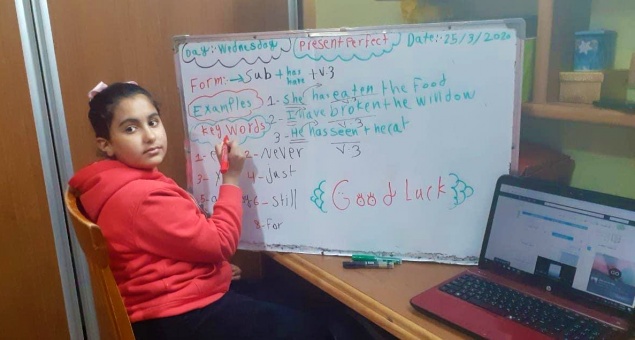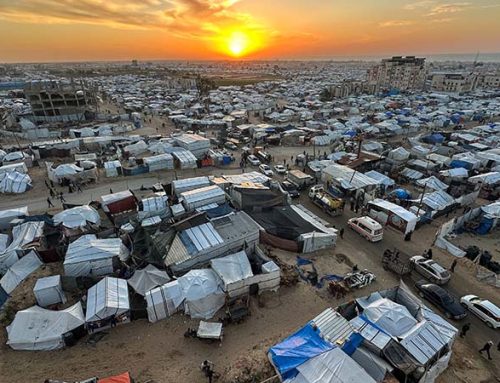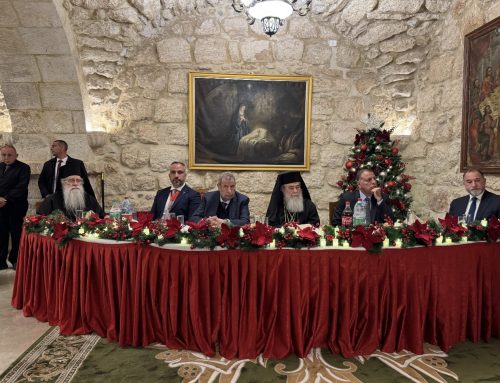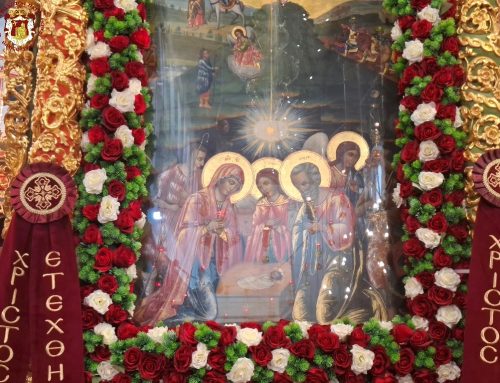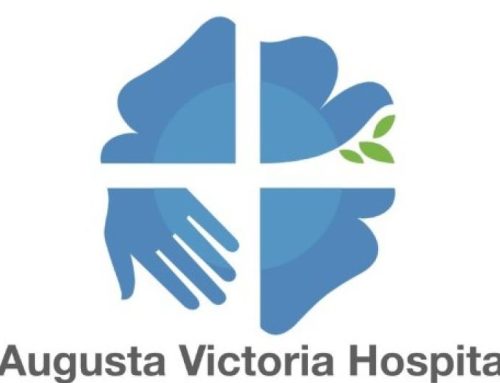Covid-19 Appeal
Urgent Support for Needy Families of the students enrolled at
Schools of the Latin Patriarchate in Jordan and Palestine
(Download Appeal file here: Covid-19 Appeal)
The Catholic Church of the Holy Land has always prided itself with its strong institutional presence and major contributions in the fields of education, health, and social services. Nothing is more evident that the ecumenical and interfaith contributions through Catholic schools serving with distinction all segments of society regardless of their religious background, nationality, political affiliation, color or gender. This beautiful mosaic is built around a value set that filters through every student, parent, and teacher that teaches respect, coexistence, tolerance, peace and love in a region that is often marred by violence and wars. Thus, sustaining this presence and contribution is sacred for us in the mother church.
Given the severity of the pandemic and its devastating effects around the world, the lack of strong health and economic structures in both Palestine and Jordan characterized by massive loss of jobs and income, most families turned to use available resources to meet basic needs. Thus, the ability of the parents of 12,456 students who still owe a tuition balance in our 38 schools in Jordan and Palestine became next to impossible. At the same time all schools turned to distance learning immediately after the lockdowns were imposed and teachers responded and continued the educational process from home under very challenging conditions. Ethically and morally they should be compensated for their services. The total owed to date is $7,194,264 which is a phenomenal amount.
While we expect some parents will find the means to pay and we are sure they will do the responsible thing and settle their amounts. However, the majority will not be able to do so which will leave a deficit that will shake the very existence of these schools, some of which have a tradition of over 150 years.
Our five schools in Israel are in a completely different category, where unlike the poor economies of Jordan and Palestine, Israel launched a stimulus package to support the unemployed and closed businesses and guaranteed that already made financial commitments to the schools will be honored. Thus, we do not anticipate any problems with those schools.
With this, we appeal to all our brothers and sisters around the world to provide urgent support for the needy families of the 12,456 students enrolled at the 38 Latin Patriarchate Schools in Jordan and Palestine to help them meet their financial obligations. This will allow them to use the other limited available resources to meet other urgent needs during this pandemic. This will indirectly help us keep our cherished institutional presence in education strong, well and alive. Given the global nature of the pandemic and realizing that the suffering is in every corner of the world, any amount regardless of its size will be greatly appreciated.
Your financial giving is a life-giving, hope-filled expression of Christian ministry. As you reflect and pray on our very difficult situation, may the Gospel passage be a helpful guide: “Give, and it shall be given unto you; good measure, pressed down, and shaken together, and running over, shall men give into your bosom. For with the same measure that ye mete withal it shall be measured to you again” (Lk 6:38).
We sincerely thank you in advance for keeping your brothers and sisters in the Holy Land in your thoughts and prayers.
The following pages provide further details about the situation as well as information on ways to make a donation.
† Pierbattista Pizzaballa
Apostolic Administrator
The Latin Patriarchate of Jerusalem
The Latin Patriarchate of Jerusalem (LPJ) was restored in 1847, and since then is promoting the best interests of the local communities it serves. Today, the Patriarchal Diocese oversees about 180,000 of diocesan faithful in four countries – Palestine, Israel, Jordan, and Cyprus, covering a rich tapestry of cultures, languages, religions, and traditions. Serving all with special emphasis on the support and care of indigenous Holy Land Christians remains the enduring mission of the Mother Church, the Latin Patriarchate of Jerusalem.
Introduction
Latin Patriarchate Schools
The Latin Patriarchate has a network of 43 schools: 13 Schools in Palestine, 25 in Jordan, and 5 in Israel, which offer the youth throughout Jordan, Palestine, and Israel a wholesome learning environment that nurtures growth. The LPJ is committed to providing quality education for boys and girls, Christians, and Muslims in all its schools, Kindergarten through Grade 12. The LPJ school system is a major source of employment in the region with 1,808 professionals, teachers, administrators, and educators serving around 19,926 students. Since their inception, they have accepted students from all communities and denominations and offered a solid foundation in religious, moral, and intellectual education. Being parish schools, they work towards human and social development with emphasis on needy populations. Thus, improving the schools in villages helps reduce Christian migration to the cities and emigration to other countries and fosters ecumenical and interfaith experiences. All LPJ schools nurture the parishes and the parishes nurture the schools and it is difficult to see a vibrant parish in the Holy Land without a school. The Latin Patriarchate believes that access to excellent education established on sound stewardship principles should be accessible to all, regardless of status or family income. LPJ subsidizes tuition costs of needy students, and maintains schools in marginalized areas, operating at a substantial financial loss. Although fee-paying, the fees are the lowest amongst the Christian schools making them accessible to everyone, regardless of families’ income. Thus, the poorest families are either exempt from tuition fees or receive generous discounts. This access to education for all would not be possible without donations and major financial support from generous donors.
During the recent Covid-19 crisis all LPJ schools shifted immediately to distance learning using the EduNation platform and the educational process continued at full speed, despite all the many challenges. Thus, teachers went beyond the call of duty to teach from their homes despite inadequate hardware, internet infrastructures or proper training. Students on the other hand struggled also with limited computer availability, especially with multiple children sharing the same machines, as well as weak or no internet infrastructure in many rural locations. It is anticipated that the school year may be concluded without a return to the classroom.
Background of the Appeal
The COVID-19 pandemic outbreak has resulted in large-scale lockdowns and curfews, travel restrictions, global public health crisis, and main losses across worldwide financial markets. When the pandemic swept the world, Israel, Palestine, and Jordan took emergency measures including the closure of all schools, universities, and had all citizens stay at home. Israel is a well-developed country with a strong health system and a booming economy. However, Palestine and Jordan were left striving to face the severely under-equipped health sector, insufficient medical resources, and a severely weakened economic sector. This had a severe adverse impact on the countries’ economies with many families left without any income, high unemployment, and a major struggle to pay for basic needs. The pandemic put a huge strain on most families in the Holy Land shedding light on the fact that Palestine is a country that has been struggling with the effects of decades of military and economic occupation, and Jordan is a country burdened for too long in playing host to millions of refugees and migrants with limited natural resources.
Since the beginning of the pandemic and the resultant massive loss of jobs, mostly in Palestine and Jordan as both countries lack the social benefits and comprehensive health insurance like those offered by the State of Israel, the increase in the requests for humanitarian assistance has been exponential. In Palestine, loss of employment in the tourism industry, the closure of all small businesses, and transportation related services has been mind-boggling. Additionally, given the economic downturn in Israel, most of, if not all, the 1000+ Palestinian day-laborers in Israel lost their income as the commute to Israel was no longer possible.
In Jordan, a similar scenario played out in its already depressed economy. It took another major hit with unemployment skyrocketing. In both countries, most families are struggling to make ends meet. A rapid needs assessment through our parish priests and social services’ department identified most Christian families struggling to meet basic needs such as food, medicines, hygiene supplies, electric utilities, and cooking gas. In some instances, families have requested assistance to pay rent given landlords’ dependence on such income. Gladly, in the initial phases, community-to-community and neighbor-to-neighbor support worked very well and lessened the longer-term impact. Moreover, donations received for humanitarian needs have already been distributed through parish priests who coordinate with local authorities, emergency committees, local charities, and scout troops to ensure the needs of the most severely affected are taken care of.
General economic indicators show that Jordan was already suffering a high unemployment rate prior to Covid-19, reaching 19%; youth under 19 unemployment reaching 49%, and a 39% rate for those between ages 20-24. These rates have doubled in recent weeks. In pre-Covid-19 Palestine, the unemployment rate in the Gaza Strip was 45% (70% amongst the youth and women) compared with 15% in the West Bank, resulting in a 29% average unemployment rate. The most recent data has not yet been published, but the general rate is expected to have doubled. Further, the number of Palestinians employed in Israel and Israeli settlements was about 133,000 in 2019.
Due to the pandemic, most of them were laid off and ordered to return to Palestine, pushing an already high unemployment rate further. The closure of all stores, schools, universities, private and public institutions, and government offices, except for essential providers (pharmacies and food), as well as all tourism related businesses forced many employers to make employees redundant. Most employers stopped paying salaries, which have left many families with no income. It is noteworthy that there are no governmental supports to speak of, in both Jordan and Palestine. Despite this lack of support, strict regulations are in place requiring employers to resume paying full salaries with additional regulations that prohibit ending the employment of any employee.
This has added a financial strain on most organizations especially on the economically most vulnerable, small, and medium enterprises. In Israel, a generous stimulus package amounting to $35 billion plus was approved to pay for the unemployed and support for closed businesses. Existing commitments through generous subsidies to the school system were confirmed by the Ministry of Education allowing the schools budgets to function normally thus relieving our network of schools there of any major loss of income.
Appeal Description
As the Covid-19 pandemic spread around the Holy Land, the schools’ administrations quickly complied with and adopted different strategies to continue teaching with the available capabilities despite the obstacles. Thus, teachers continued to work and provide services, in some instances under much more demanding and challenging circumstances working from home. This unprecedented situation has put a huge strain on most students’ families in the Holy Land who were already struggling before the pandemic to pay for basic needs. Families are now unable to pay their children’s tuition fees since the majority are unemployed. The number of families in financial distress has dramatically increased; consequently, burdens have multiplied. The LPJ is already providing humanitarian support to help families cope and put them back on their feet. Funds have already been received and disbursed through parish priests to support the neediest.
As for the schools’ financial administration, the most favorable months for tuition collection at schools are March, April, and May of each school year; a time when parents settle outstanding balances for the year and pay the registration fees for the following year. Given the current situation of panic and high unemployment and loss of income, we expect that collecting further tuition fees for the balance of the year will be very challenging. Thus, the expected deficit in both Jordan and Palestine schools if no further collections are made is $7,194,264 ($4,327,864 in Jordan and $2,866,400 in Palestine – the financial breakdown of these figures per school is available in Appendix I.)
It means that schools will operate in serious deficit and will have a serious cash-flow problem if they do not collect most of this amount. Allowing the deficit to increase dramatically, may put the sustainability of the schools in question; and eventually will hinder their ability to pay salaries to their staff and schools’ teachers. It is a huge challenge for LPJ to meet the payroll in full and some drastic steps such as payment of partial salaries and/or layoffs will have to be considered. This will be a very painful decision since most of our employees are Christian and it will add dramatically to the financial distress they already face with the unemployment of spouses, in many instances. Most staff are working remotely from home as much as possible and have not shied away from providing services based on the means available and thus morally and ethically should be entitled to compensation.
It is noteworthy that at each school a financial aid committee consisting of the parish priest, school principal, school accountant and social workers will review all applications received and direct the aid to the neediest while encouraging the few with the financial means to settle their tuition fees themselves. Thus, the aid will not cover all but will be based on clear criteria and need. The criteria will take into consideration the socio-economic status of the family; loss of jobs for one or both spouses; size of the family; current income level; number of students in the same household; presence of elderly, sick or special needs students within the household; as well as other key indicators.
Beneficiaries
● The direct beneficiaries of the project are the needy families of the 12,456 students enrolled in the Latin Patriarchate schools, who will be able to fulfill their financial obligations.
● The Jordan and Palestine Latin Patriarchate schools’ 1,390 employees including teachers, support staff, and administrators and their extended families to ensure continued employment and income.
● The 38 Latin Patriarchate schools operating in Jordan and Palestine which are operating in serious deficit mode, to ensure their future continuity and sustainability as quality parish schools and avoid any school closures in the immediate future.
● The indirect beneficiary of the project is the Latin Patriarchate of Jerusalem, that strives to provide the best for the parishioners and all faithful, and to allow the continuity of the LPJ biblical mission in serving its communities in the Holy Land.
Proposed Budget
A list of the total number of students attending 13 schools in Palestine and 25 schools in Jordan along with the number of students owing tuition and the total amount owed per school are available in Appendix I, at the end of the appeal. In total we have 4,789 students owing $2,866,400 in the Palestine schools and 7,667 students owing $4,327,864 in the Jordan schools. Any contribution made through this appeal will be greatly appreciated.
Ways to Donate
The most efficient way to donate would be through a bank transfer to the bank account indicated in Appendix II.
If you prefer a different mode to make your donation, please contact us at the email listed below.
A note addressed to Archbishop Pizzaballa indicating the amount of the donation will be greatly appreciated and could be sent by email through this special Covid-19 Appeal email at: appeal@lpj.org
“We pray today for teachers who have to work so hard to provide lessons via the internet and other digital ways, and we also pray for students who have to take exams in a way they are not used to. Let us accompany them with prayer.”
Source: Latin Patriarchate of Jerusalem

